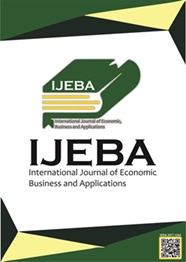Strategic Development of School With Environmental Concepts A Case Study At KharismaBangsa Bilingual Boarding School And SMAN 8 Pekanbaru
Abstract
Keywords
Full Text:
PDFReferences
Dalyono. 2005. The Influence of Interest and School Environment to Economics learning Achievementon students of high school Muhammadiyah Waru Class VIII Academic Year 2013/2014. University of Muhammadiyah. Surakarta.
Kadir, Z., I, Bizzy., B Y Suprapto., Marwanin., H, Alian. 2013. Procedure socialization of Electrical Energy Saving Usage in Equipment AndRoom Management of Some Schools in Inderalaya Ogan Ilir. Journal of dedication Sriwijaya.Sriwijaya University
.
Ministry of Environment. 2009. Handbook 2010: Adiwiyata; Create School with Cultured and Environmental Caring.
East Jakarta: Deputy Education and Environmental Communication Affairs, Deputy for Environmental Communication and Community Empowerment, the Ministry of Environment.
Kusmiyati. 2013. 3 Standard Termsof Hygiene Toilet. www.health.liputan6.com. Visited in June 2016.
Kusrini, T. 2015. The Behavior of littering by Society in the Kapuas River Bank, A Case Study in the Villages Bangka Belitung lautsub district of South East Pontianak. Socioloque Journal Volume 3 Number 3.
Marhalim. 2014. Community Supervisory Empowerment StrategisIn Mangrove Conservation in Bengkalis. Journal of Environmental Studies, 2 (2): 189-197.
Nawasis. 2015. Guidelines for Spatial Planning around landfill waste. www.nawasis.com. Visited in December 2015
Nor, IN A. 2009.Green Open Space.www. simpang mahar.Blogspot.co.id.Visited in June 2016.
Raharja, H. 2006. Ecosystem Learning in the School garden. http://researchengines.com. Visited in June 2016.
Rangkuti, F., 2009. SWOT Analysis Techniques Dissecting Business Case: Reorientation of Strategic Planning Concepts for the 21st Century sixteenth publication . Gramedia Pustaka Utama, Jakarta. 188 Page.
Rianto, M. 2007.Pakem Classroom Management Model. Dirjen Pmptk. Jakarta.
Slameto. 2010.Learning and AffectingFactors. Rineka Cipta. Jakarta.
Sinaga, R. 2011. School Environmental Hygiene. www.Hendrariahdo.Workpress. Com. Visited in June 2016.
Sudarwati. 2012. Environmental Education Policy Implementation State high school 11 SemarangTowards school of Adiwiyata. Universitas Diponegoro. Semarang.
Sujarna. 2014. Analysis of Character Education In create awareness toward Environment for State vocational school 4 Pekanbaru. Journal of environmental science, 8 (1) : 51-71.
Surakusumah, W. 2009.Concept of Environmental Education. www.es.scribd. com. Visited in April 2016
Widiyaningrum, P. Lisdiana, E. Purwantoyo. 2015. Evaluation of Student Participation In Waste Management to Support Schools Program of Adiwiyata. Indonesian Journal Of Conservation Volume 04 (01).
Wijaya. 2008.Models of Learning. PPPPTK. Yogyakarta.
Wuryadi, 2009.Education for BuildingNation and itscharacter. Professor of State Universityof Yogyakarta. Yogyakarta.
DOI: http://dx.doi.org/10.31258/ijeba.1.1.24-31
Refbacks
- There are currently no refbacks.





.png)
.png)
.png)


